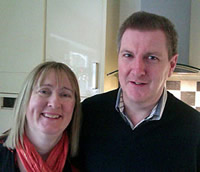Hammersmith Hospital Centre Carries Out 1,000th Transplant
Hundreds of lives transformed by surgery since 2005
Since the centre opened in October 2005, its transplant surgery has transformed the lives of around 150 people each year.
The centre is the biggest of its kind in Europe and offers deceased donor kidney transplants, live donor kidney transplants and pancreatic transplants.
Mr Vassilios Papalois, consultant transplant surgeon and renal and transplant chief of service at the Trust, says: " We are delighted to have had the opportunity to transplant so many patients successfully and dramatically improve the quality of life of hundreds of individuals and families."
Performing approximately 150 transplant operations a year, the centre also provides kidney dialysis for 10% of the UK’s dialysis needs and looks after approximately 3.5 million people in North West London. It has 23 dialysis stations for inpatients and outpatients, and runs eight satellite units so that people can have dialysis closer to home.
"At Hammersmith we are in the unique position that we can help high risk patients to have a kidney transplant," says Mr Vassilios, "such as the elderly, patients with a high body mass index as well as patients with cardiac and vascular problems. We can also transplant patients who have a complicated anatomy, for example kidneys with multiple arteries."
Healthcare specialists at Hammersmith Hospital are also able to successfully match living kidney donors to recipients who have incompatible blood types. For example, on certain occasions a patient who has blood group O can receive a transplanted organ from a patient from blood group A.
If a living donor and recipient are incompatible or mismatched by blood type or tissue, it is also possible for them to be matched with another donor and recipient pair and the kidneys exchanged – this is called paired donation.
In 2010 Hammersmith Hospital took part in the UK’s first ‘paired and pooled’ three-way transplant, which allowed three pairs of donors and recipients to ensure their loved ones had a transplant.
Mr Vassilios continues: "We are always striving to educate patients, their families and friends, about the benefits of living organ donation and run regular education seminars.
"Living donor transplants statistically lead to better outcomes and the survival rate of transplanted live kidneys is higher meaning that patients can stay off dialysis for longer."
The Trust employs a number of live donor co-ordinators who are focussed on matching donor-recipient pairs and educating potential donors on the process. They also perform outreach work in black and minority ethnic communities where the rate of live donation is particularly low and there is a shortage of organs.
Sean Hickey is one patient who has benefited from the centre's skills. Sean, 48 who lives in Uxbridge received a transplanted kidney from his wife Marcella in October last year at Hammersmith Hospital after being diagnosed eight years before with a renal condition.
" Over the eight years before I had my transplant I was monitored and measured on a regular basis by Dr Hill at Hillingdon Hospital," says Sean. " It was only in the last three to six months before the transplant that I began to decline and feel exhausted.
" A couple of years ago I went to my first transplant seminar at Hammersmith Hospital to find out what the process was for live donation. At first I wasn’t keen because at the time my two children were doing their exams at school and I didn’t want to disrupt our family life.
" Although my wife came forward to offer me her kidney, I was reluctant to accept it."
Wife Marcella however was adamant, and after going to more seminars and consulting donor co-ordinators, the couple decided to go ahead. "
I felt better almost immediately when I came around from the operation," says Sean. " My wife and I stayed in hospital for 8-10 days and the first six weeks of recovery were slow. Gradually I built up my stamina though and six weeks ago I managed to go back to work.
" If I was asked about live donation, I’d say go for it! It’s made a real difference to my life."
The centre says anyone can join the organ donor register. Age isn’t a barrier and neither are most medical conditions. People in their 70s and 80s have become donors and saved many lives. If you are interested in joining, visit the Organ Donation website.
May 3, 2012
Related links
|
